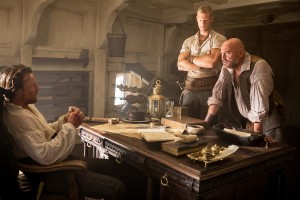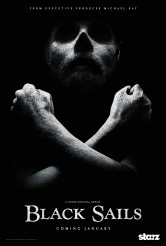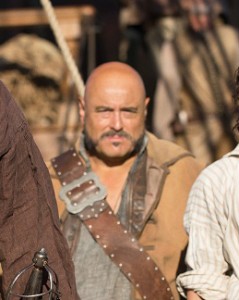Mark Ryan is – and has been – quite a few things. He’s an author, a creator of two Tarot decks (THE GREENWOOD TAROT and THE WILDWOOD TAROT), writer and composer of a musical version of WUTHERING HEIGHTS and a former member of the British Special Forces. He was Bob Anderson’s assistant sword master on FIRST KNIGHT and sword master on KING ARTHUR. As an actor, Ryan originated the role of Magaldi in the premiere West End production of EVITA, then moved up to playing Che, was the first known Saracen Merry Man in ROBIN OF SHERWOOD and voiced Bumblebee in the first TRANSFORMERS film (as well as being supplying the on-set voices for all the Transformers during shooting). Now the English actor from Yorkshire is playing an eighteenth-century pirate – one Mr. Gates, quartermaster aboard The Walrus in Starz’s new drama BLACK SAILS, Saturdays at 9 PM.
Sitting down in his apartment over several cups of tea, Ryan talks about his new gritty gig, in which there is less swashbuckling than canny manipulation and brutal battles to the death.
ASSIGNMENT X: How did you become involved with BLACK SAILS? Was this due to your TRANSFORMERS experience working with Michael Bay, who is one of BLACK SAILS’ executive producers?
MARK RYAN: Yes, sort of. What happened was, my manager called me up and said, “Starz is doing this TV show about pirates. There’s a character that you’re absolutely right for. Who do you know over there that you can talk to at [Bay’s production company] Platinum Dunes?” I called Ian Bryce, who runs the TRANSFORMERS films. He’s a good guy, and he’s very professional. He’s a diamond, as we say. And he said, “Oh, Andrew Form and Brad Fuller [who run Platinum Dunes for Bay] are in the next office. I’ll just go over there and knock on their door. I’ll call you back in fifteen minutes.” So sure enough, he called me back and said, “Andrew Form is next door, he’s waiting for your call – call him.” And I said, “Okay, thank you.” So I called and Andrew said, “Thanks for calling. Yeah, you’re absolutely right, you’re perfect for this part, let’s see what we can do. Michael speaks very highly of you.” And so I met the casting people and I read for the part and I felt I’d done well, I felt I knew the character, I knew what they were looking for. And I came away thinking, “Oh, that’s good.”
We didn’t hear anything for a week or two and finally my manager called up wanting to find out what was going on. And they said, “No, we’re not going any further with Mark, we’re going to cast it out of South Africa.” “Okay, fine.” I understand that. And so I filed it away in its little box and went about my business. I was actually out doing a book tour with John Matthews for WILDWOOD TAROT – I think I was actually up in Seattle – and the phone went, and it was from Platinum Dunes, and they said, “When are you coming back? You’re going back to read with John Steinberg, the show runner for BLACK SAILS.” And I said, “Oh, okay.” And so I ended up having a meeting inLos Angeles with John. And I don’t know if they were having trouble casting the part, or what the issue was, but anyway, I went back in and read again and basically did what I did before. As we were chatting, he said to me, “Have you got any questions?” I said, “Yeah, I’ve got lots of questions. You wrote this, so why don’t you tell me what you think this character is?” And so John told me about the arc of the character, his relationship withFlint [the captain played by Toby Stephens]
And he asked, “Okay, what do you think about the character?” And I said, “Well, the quartermaster historically was the nexus point of power between the crew and the captain.” It was a very democratic system, actually. It sounds like it shouldn’t be on a pirate ship, but it was. They actually had the powers to vote in the boson, the quartermaster and the captain. If the captain wasn’t doing what they wanted, they could vote him out and send him on – if he was lucky. They’d cast him adrift sometimes. [The crew] basically put their marks on the agreements that the captain was only fully in charge of the boat when they were in battle. When they weren’t in battle, it was the quartermaster and the boson who were running the way the boat actually functioned. And they were responsible for discipline and organization on the boat. But when they were in battle, the captain had total control. And I said, “Look, what I know about that person, having served myself, is that the officers give orders, but it’s the sergeants who carry them out. It’s the middle management, it’s the non-commissioned officers, the blue-collar guys that deal with the men, that cajole the men, that have to relate to all of them and their issues. And on a pirate boat, we have different cultures, different religions, different ages, different ambitions, even sometimes different national groups. You have different people from all over. So the job was to get that eclectic mix of wills and get them to follow behind what the captain wanted to do. And you had to use sometimes humor, threats, cajoling – but they had to respect the quartermaster. He had to lead them sometimes into situations they didn’t want to go in. That’s how I would approach it. This character is a blue-collar guy who’s been at sea for a long time, and that’s why they respect him and that’s why he’s able to manipulate, cajole, kick, push the men into doing what he wants them to do for the captain.”
AX: Your only other seagoing experience onscreen had been PASSIONS, right?
RYAN: That’s right, yes, on a huge tank at the NBC lot, where I played a captain trying to rescue one of the characters from the show who’d blown overboard, and it was quite an experience.
AX: And there were people out of camera range throwing buckets of water on you to simulate a storm?
RYAN: Yes. We did that on BLACK SAILS as well, except they hosed us down. They actually hosed us down at three o’clock in the morning looking out over the African tundra and the bush. It’s what you do – it’s what one does for one’s art.

Toby Stephens (Captain Flint), Tom Hopper (Billy Bones), Mark Ryan (Gates) in BLACK SAILS - Season 1 | ©2014 Starz
AX: BLACK SAILS was made in and around Cape Town, South Africa. How did they make these seventeenth-century pirate ships look real?
RYAN: They basically built two full-size boats. One was sort of split in half so that we could shoot in the decks and you could come down into the body of the ship, and one was a full-size ship, but both were built on this massive tank, which they could put waves in. They were built on gimbals, so they could move them around the tank. They would put them sometimes side by side, or they could move the ships, they could maneuver the ships around the tank. The gimbals actually rocked, so it looked like the ship was rocking in the water. Quite a mechanical feat.
This show probably was impossible, the way that we’ve done it, ten years ago. It may not have even been possible, say, seven years ago. What makes it possible now is the technical advances, where we are now looking out over boats on this tank literally at the African bush stretching for miles, with an airport down the road and a freeway about a mile away. And with the help of CGI and green screens, you’re going to believe these boats are at sea. The first time I saw some of the stuff in San Diego[at Comic-Con], I went, “Wow, it really does look like the ocean.” Which is one of the most difficult things, CGI-wise, to make, because everything is moving. But what I learned from TRANSFORMERS, when we first saw how the Transformers would work, I went, “This is changing everything, this is going to change everything, that you can take this complexity of things moving and rotating into a film and bring it to life, like Bumblebee or Jetfire or any of these characters, and make it look like it really is in that [environment].” And now it’s got to the point where you believe that those boats are on the ocean. I went, “Wow, we are there. We’re at a certain place now where anything you can imagine can be filmed.”
AX: Besides understanding how the chain of command worked, did your own experience in the British armed forces, particularly serving at sea, help you with at all with BLACK SAILS?
RYAN: One of the things that I recall – I even told this to John [Steinberg] at the time – “Until you’ve been out on a ship in a big sea, you really don’t understand the [ocean’s] power.” I have nothing but total respect for these people that three hundred years ago were sailing literally across the Atlantic in what was essentially a small wooden boat with no sanitation, with rudimentary navigation devices. I’ve been on a big warship, HMS Fearless, which was a helicopter platform, and we were out in the North Sea on an exercise, and it was an eight- or nine-force [gale] and big boats are literally being thrown into the air. And I remember having to go from the shed that was on the top of the boat, the super-structure of the boat – I would usually go through the bridge to go to the loo and it was in the middle of the night, three or three-thirty, and I had to go to the loo, and they were having a big powwow about the issue of the sea, the fact that it was breaking up the entire fleet. There were ships that were retiring with big cracks because the ocean was picking them up and shaking them and planting them down again and the ships were literally getting broken. And so I went around that and had to go down this ladder on the super-structure down to the deck below, and when I was climbing back up, we were heaving through the ocean, and the entire ship was rolling, almost at forty-five degrees, to the ocean and I was hanging on to this ladder, and as I looked down, there was the ocean and these massive waves, and I looked out into the darkness and I went, “You better not let go, boy, because if you let go, they won’t even know you’ve gone – you would be out there and that would be the end of you.” But I remember looking out at that ocean and thinking, the power of nature, the power of the ocean, is extraordinary, and until you’ve been on a big ocean and seen what that can do to even a big warship – and so my respect for what they did during that period [of BLACK SAILS] is awesome [laughs].
AX: Do you think there’s a certain mindset that goes into somebody who decides to be become a pirate, versus the landlocked version of whatever that would be – I guess a robber?
RYAN: I think the ocean is very emotional. Water is an iconic Jungian archetype, and there’s a certain relationship between human beings and the ocean, and it’s to do with the depths and the unknown, and some people have a different relationship to the ocean than others. without giving too much away, I have a wonderful speech in the show where Toby and I [as Flint and Gates] are discussing our lives and our relationship to the men and the boat and the ocean and our personal history, and I have this amazingly beautifully written monologue about the pirate’s relationship to the ocean, and the starkness of that, the brutality of that, the simple nature of this very powerful element that we make our living from, that we have a relationship with and eventually we will go to and will be swallowed by and there will be no marker, no headstone, no legacy. We leave behind nothing, we’re just swallowed, taken whole by the sea. And it’s an amazing and beautifully written speech, and it kind of for me embodied the relationship between seagoing men of that period and the ocean.
AX: In BLACK SAILS, is there a philosophy of piracy?
RYAN: Yes. Obviously, there were several different philosophies about what piracy actually meant. For some, it was just pure profit, in terms of, they could do it, so they did it. There were some that had various concepts of where they could take it, and some of those are expounded on in the show. And I think you have to look at it in the context of what was happening around the world, that new nations were being forged. [BLACK SAILS is set] not that long before the American Revolution took place in 1776, and before that, that was already fomenting in the Colonies. So it’s not that long before the concept of revolution, that the people were flexing their muscle against what they saw as traditional power and control politically, and so new nations were forming, new alliances were forming, new ways of viewing the world, acceptance of different religions and different spiritual concepts were coming. So there was still a lot of the world yet to be discovered and exploited. So the concept of a nation, a new nation of free men who fought and struggled against the empires and founded their own way of living in a democratic society, that was something that was obviously in the consciousness of the period. So that’s one of the things that’s explored in the show.
AX: Do you think those pirates have much in common with modern-day pirates?
RYAN: No, I don’t. I think that what we’re seeing [now] are people who were ordered by warlords to go out and raid. They don’t live on their boats and sail around the world. It physically is impossible to do that any more. I mean, maybe if you have a nuclear-powered submarine, you can stay underneath the surface and travel the world, but a modern-day ocean-going pirate vessel would be hunted down by satellites and aircraft and blown out of the water. So what these guys do is they pop out in their little boats, raid along their coastline and take prisoners for ransom and also whatever’s in the boat and take it back to their warlords. That’s not quite the same as rebelling against a British Navy or aDutch East Indies [Company] or any one of those that at the time and the period were seen as the Powers That Be. I don’t see much modern equivalent to that, except in the level of violence. There’s no doubt that piracy was a very dangerous and otherwise quite brutal existence. They weren’t nice people.
LET YOUR VOICE BE HEARD – COMMENT BELOW
Follow us on Twitter at ASSIGNMENT X
Fan us on Facebook at ASSIGNMENT X
Article Source: Assignment X
Article: Exclusive Interview with BLACK SAILS star Mark Ryan – Part 1
Related Posts:












